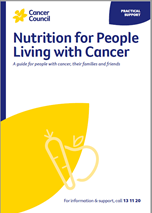- Home
- Cancer Information
- Living well
- Nutrition and cancer
- Other nutrition concerns
- Eating with a stoma
Eating with a stoma
In some cases, after surgery for bowel cancer you may need a stoma. This may be temporary or permanent. A stoma is a surgically created opening in the abdomen that allows bowel movements (faeces, stools or poo) to leave the body. The end of the bowel is brought out through the opening and stitched onto the skin. A bag is attached to collect the faeces.
If you have a stoma, you may need to change what you eat in the first few weeks to help the stoma settle. The amount of matter coming out of the stoma (output) will vary depending on how much you eat and when you eat.
What to eat when you have a stoma
- Work with your dietitian to explore which foods cause problems for you. Different foods can affect people differently.
- Keep a diary of what you eat and how it affects you. Make a note of the foods that cause constipation or diarrhoea, gas, pain or bloating. It is better to limit – not eliminate – these foods in your diet, as you may find that what you can handle improves over time.
- When returning to your usual diet, introduce one food at a time. If something causes a problem, try it again in a few weeks to see if your response has improved.
- Share this information with your dietitian or the health care team because it can help them figure out how to manage any issues.
- Sometimes foods such as nuts, seeds and very fibrous foods can build up and block the stoma. A stoma blockage can be uncomfortable and cause a bloated feeling or nausea. If you experience symptoms of a blockage for more than two hours or you start vomiting, contact your nurse or hospital.
- If your stoma output is higher than recommended, drinking oral rehydration solutions can help replace the lost fluid. You can also ask your dietitian for information.
For more on this, see Bowel cancer and the Australian Government’s Improving Bowel Function After Bowel Surgery.
→ READ MORE: Nutrition and advanced cancer
Podcast for people affected by cancer
Listen now
More resources
Jacqueline Baker, Senior Oncology Dietitian, Chris O’Brien Lifehouse, NSW; Lauren Atkins, Advanced Accredited Practising Dietitian, OnCore Nutrition, VIC; Dr Tsien Fua, Head and Neck Radiation Oncology Specialist, Peter MacCallum Cancer Centre, VIC; Rosemerry Hodgkin, 13 11 20 Consultant, Cancer Council WA; Clare Hughes, Manager, Nutrition Unit, Cancer Council NSW; John Spurr, Consumer; Emma Vale, Senior Dietitian, GenesisCare, SA; David Wood, Consumer.
View the Cancer Council NSW editorial policy.
View all publications or call 13 11 20 for free printed copies.
Need to talk?
Support services
Coping with cancer?
Speak to a health professional or to someone who has been there, or find a support group or forum
Need legal and financial assistance?
Pro bono services, financial and legal assistance, and no interest loans
Cancer information
Surgery
Surgery is a procedure to remove cancer from the body or repair a part of the body affected by cancer
Cancer treatment
Learn about the different treatments that are used to treat cancer, such as surgery, chemotherapy, radiation therapy and targeted therapy

